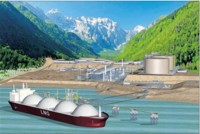Natural gas to fuel B.C.'s new economy
 British Columbia Premier Christy Clark has announced a new provincial natural gas strategy based on four priorities for long-term economic prosperity under the BC Jobs Plan.
British Columbia Premier Christy Clark has announced a new provincial natural gas strategy based on four priorities for long-term economic prosperity under the BC Jobs Plan.“We are creating new and exciting opportunities by diversifying our natural gas sector, strengthening job prospects for British Columbians and opening the door to new clean energy projects,” said Premier Clark speaking yesterday at a press conference at the B.C. Institute of Technology (BCIT).
“My government is positioning liquefied natural gas (LNG) as a cornerstone of British Columbia’s long-term economic success,” she added.
The Natural Gas Strategy and a complementary strategy focusing specifically on the development of a brand-new LNG sector, were released by Premier Clark at the BCIT press briefing.
The four priorities of the Natural Gas Strategy commit the province to:
***Greater emphasis on market diversification to increase the value of B.C.’s natural gas.
***Support job creation together with industry, educators and communities.
***Continued strong leadership on clean energy and climate change moving forward.
***A redefinition of the Province’s self-sufficiency policy to ensure B.C. is well-positioned to power expansion.
The strategy is intended to support job creation, economic development opportunities, and job openings that are expected to increase as a result of growth in the natural gas sector and the emergence of a LNG industry.
Indirectly, growth and a new LNG industry could generate thousands of spin-off jobs in the fields of transportation, engineering, construction and environmental management.
“Today’s announcement is an important milestone in achieving the BC Jobs Plan goal to expand natural gas production and develop a competitive LNG industry in B.C.,” stated Jock Finlayson, executive vice president of the Business Council of British Columbia.
“While the necessary commercial arrangements are still to be finalized, we are encouraged that the government is moving to establish the enabling conditions to attract major new private sector investment into LNG facilities and infrastructure. As these investments are made, British Columbians will benefit as the province gains access to new markets for our growing natural gas reserves.”
“The BC Government’s new natural gas and LNG energy strategies have the potential to stimulate economic activity across the energy sector on a scale comparable to the W.A.C. Bennett hydro developments of the 1960s,” said Paul Kariya, Executive Director of the CEBC. “BC’s clean energy producers strongly support the plan to use clean electricity as the preferred source for power in LNG production in order to maximize the environmental benefits of natural gas exports.”
B.C. leadership on climate change and clean energy production is the cornerstone of the Province’s natural gas strategy. Natural gas is a cleaner burning fossil fuel and the province believes that by exporting LNG, British Columbia will make a significant contribution to combating climate change on a global scale.
“B.C.’s natural gas will help with the transition to a low-carbon global economy by displacing Asia’s current reliance on other carbon-intensive fuels like coal and diesel,” said Premier Clark.
“To protect our environment here, we also plan to introduce more ambitious means of offsetting greenhouse gas emissions, such as carbon capture and storage, while balancing growth.”
British Columbia will be home to the world’s first LNG export facilities that use clean energy. BC LNG Douglas Channel and Kitimat LNG will access clean energy from the Province’s existing grid. As new infrastructure is built and the industry expands, future energy needs will be served by local, clean energy, with B.C.’s natural gas used to support energy reliability if required.
Discussions are underway now with LNG proponents to assess power requirements for future projects.
“Again, B.C. is demonstrating climate leadership with the world’s first clean-energy-fuelled liquid natural gas plants,” said Minister of Environment Terry Lake.
“These two LNG plants will provide Asia with a cleaner alternative for its immediate energy needs as B.C. natural gas displaces more carbon-intensive fuels like coal and diesel. Our abundant natural gas is a bridging fuel that will contribute to global reductions in greenhouse gas emissions, as we move into the future of clean, greener energy alternatives.”
Premier Clark underlined that investments in critical infrastructure to power future LNG facilities will be balanced with the need to keep rates affordable. To do this, proponents will be required to make capital investments towards new infrastructure needed to power LNG operations.
As well, the Province will amend its existing self-sufficiency policy to better suit today’s economic realities, and to foster growth opportunities such as LNG development. The new self-sufficiency definition will require BC Hydro to meet customer demand on an average water year, instead of historically low water levels.
The government’s actions are designed to increase the value of B.C.’s natural gas by creating new markets and promoting greater diversification.
“British Columbia is in a foot race with countries such as Australia, Qatar and the United States who are interested in exporting LNG, so we are moving quickly,” said Minister of Energy and Mines Rich Coleman.
“Our plans are designed to ensure B.C. accelerates the pace of development so we can secure new contracts and seize investment while such lucrative opportunities are available.”
In addition to diversifying market exports, the Premier indicated the Province will continue to increase domestic market opportunity by promoting the use of B.C.’s natural gas in transportation fleets such as ferries and heavy duty trucks.
You can return to the main Market News page, or press the Back button on your browser.

